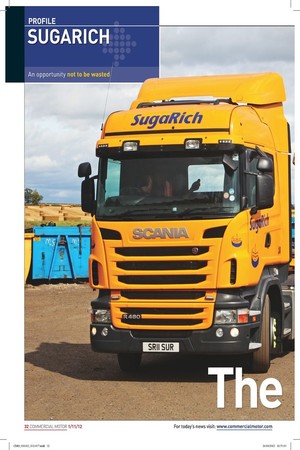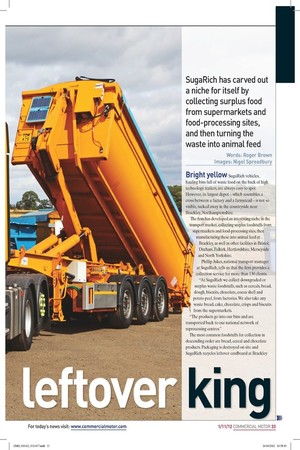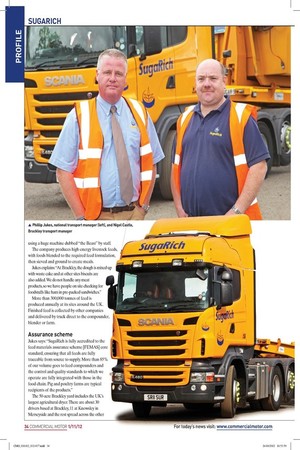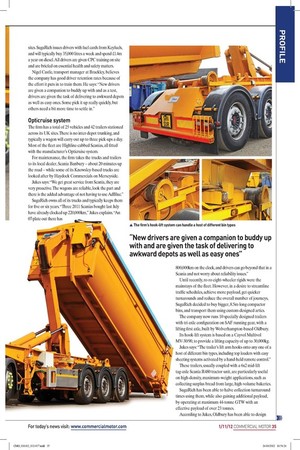SUGARICH
Page 24

Page 25

Page 26

Page 27

Page 29

If you've noticed an error in this article please click here to report it so we can fix it.
e
eftover kin
SugaRich has carved out a niche for itself by collecting surplus food from supermarkets and food-processing sites, and then turning the waste into animal feed
Words: Roger Brown Images: Nigel Spreadbury Bright yellow SugaRich vehicles, hauling bins full of waste food on the back of high technology trailers, are always easy to spot. However, its largest depot – which resembles a cross between a factory and a farmstead – is not so visible, tucked away in the countryside near Brackley, Northamptonshire.
The firm has developed an interesting niche in the transport market, collecting surplus foodstuffs from supermarkets and food-processing sites, then manufacturing these into animal feed at Brackley, as well as other facilities in Bristol, Durham, Falkirk, Hertfordshire, Merseyside and North Yorkshire.
Phillip Jukes, national transport manager at SugaRich, tells us that the firm provides a collection service for more than 130 clients.
“At SugaRich we collect downgraded or surplus waste foodstuffs, such as cereals, bread, dough, biscuits, chocolate, cocoa shell and potato peel, from factories. We also take any waste bread, cake, chocolate, crisps and biscuits from the supermarkets.
“The products go into our bins and are transported back to our national network of reprocessing centres.” The most common foodstuffs for collection in descending order are bread, cereal and chocolate products. Packaging is destroyed on site and SugaRich recycles leftover cardboard at Brackley using a huge machine dubbed “the Beast” by staff.
The company produces high-energy livestock feeds, with foods blended to the required feed formulation, then sieved and ground to create meals.
Jukes explains: “At Brackley, the dough is mixed up with waste cake and at other sites biscuits are also added. We do not handle any meat products, so we have people on site checking for foodstuffs like ham in pre-packed sandwiches.” More than 300,000 tonnes of feed is produced annually at its sites around the UK. Finished feed is collected by other companies and delivered by truck direct to the compounder, blender or farm.
Assurance scheme
Jukes says: “SugaRich is fully accredited to the feed materials assurance scheme [FEMAS] core standard, ensuring that all feeds are fully traceable from source to supply. More than 85% of our volume goes to feed compounders and the control and quality standards to which we operate are fully integrated with those in the food chain. Pig and poultry farms are typical recipients of the products.” The 50-acre Brackley yard includes the UK’s largest agricultural dryer. There are about 30 drivers based at Brackley, 11 at Knowsley in Merseyside and the rest spread across the other sites. SugaRich issues drivers with fuel cards from Keyfuels, and will typically buy 35,000 litres a week and spend £1.4m a year on diesel. All drivers are given CPC training on site and are briefed on essential health and safety matters.
Nigel Castle, transport manager at Brackley, believes the company has good driver retention rates because of the effort it puts in to train them. He says: “New drivers are given a companion to buddy up with and as a test, drivers are given the task of delivering to awkward depots as well as easy ones. Some pick it up really quickly, but others need a bit more time to settle in.”
Opticruise system
The firm has a total of 25 vehicles and 42 trailers stationed across its UK sites. There is no inter-depot trunking, and typically a wagon will carry out up to three pick-ups a day. Most of the fleet are Highline-cabbed Scanias, all fitted with the manufacturer’s Opticruise system.
For maintenance, the firm takes the trucks and trailers to its local dealer, Scania Banbury – about 20 minutes up the road – while some of its Knowsley-based trucks are looked after by Haydock Commercials on Merseyside.
Jukes says: “We get great service from Scania, they are very proactive. The wagons are reliable, look the part and there is the added advantage of not having to use AdBlue.” SugaRich owns all of its trucks and typically keeps them for five or six years. “Three 2011 Scanias bought last July have already clocked up 220,000km,” Jukes explains. “An 07-plate out there has 800,000km on the clock, and drivers can go beyond that in a Scania and not worry about reliability issues.” Until recently, ro-ro eight-wheeler rigids were the mainstays of the fleet. However, in a desire to streamline traffic schedules, achieve more payload, get quicker turnarounds and reduce the overall number of journeys, SugaRich decided to buy bigger, 8.5m-long compactor bins, and transport them using custom-designed artics.
The company now runs 10 specially designed trailers with tri-axle configuration on SAF running gear, with a lifting first axle, built by Wolverhampton-based Oldbury.
Its hook-lift system is based on a Cayvol Multivol MV-30/90, to provide a lifting capacity of up to 30,000kg.
Jukes says: “The trailer’s lift arm hooks onto any one of a host of different bin types, including top loaders with easy sheeting systems activated by a hand-held remote control.” These trailers, usually coupled with a 6x2 mid-lift tag-axle Scania R480 tractor unit, are particularly useful on high-density, maximum-weight applications, such as collecting surplus bread from large, high-volume bakeries.
SugaRich has been able to halve collection turnaround times using them, while also gaining additional payload, by operating at maximum 44-tonne GTW with an effective payload of over 23 tonnes.
According to Jukes, Oldbury has been able to design and engineer a trailer that matches the requirements of the company precisely. “The configuration improves manoeuvrability in confined loading areas compared with alternative rig options, such as rigids and drawbars,” he says. “Considerations such as speed, safety and security have been incorporated into the equipment from the start, which really helps us because schedules and turnarounds are time-critical.”
Safety features
The trailers have reflective stripes down the sides, heavy-duty LED light protectors and flashing safety lights.
Features include EBS and an electronic anti-roll device from Knorr Bremse, which means the trailer brakes come on automatically. Sensors fitted to the trailer send text alerts to Castle when the bins become two-thirds full, signalling their need for collection.
Castle says: “Tractor units have rear windows so drivers can look behind, and there are also reversing cameras so they can see the rear rollers. All lights on the vehicle can be activated from a key fob, which helps with driver walk-around checks.” Improvements, such as the use of low-profile tyres, have been adopted following driver and management feedback. The company currently has a tyre deal with Bandvulc, which supplies re-manufactured tyres, as well as Fulda products. Jukes says: “We had a look at the service Bandvulc provides, trialled it, and have been running it for 18 to 20 months now. It makes sense from a cost point of view. We put new Fulda tyres on the steer axles and constantly monitor the tread depths for all the tyres. Being in the re-manufactured food business, it is apt that we also run re-manufactured tyres.” So are there any peak periods for the firm? “At Christmas we have what we call the mince pie run,” says Jukes. “Easter and Christmas are the usual peak periods, [as they are] times when a lot of food is being produced.
“There are also big sporting events, like the Olympics and Fifa World Cup, where special-edition chocolates get made but need to get binned as soon as the event is over.” Due diligence and health and safety lie at the heart of the SugaRich operation, and it works closely with the Department for Environment, Food and Rural Affairs (Defra), which demands high standards.
Jukes believes that SugaRich has successfully embraced the culture and demanding standards of both the food and feed industries.
“What we do is a part of both the food chain and recycling, so compliance is very important to us,” he says. “Our aim is always to help our customers meet their environmental objectives.” ■
A YOUNG INDUSTRY
Surplus food recycling only really developed as an industry in the late 1970s and early 1980s, as the government began to look at shifting more waste away from landfill sites.
In the old days, firms like SugaRich used to be able to pick up the surplus food for free, but Jukes explains that nowadays firms have to pay for what they fetch.
“Recycling is becoming more important, something that has happened since the legislation on zero landfill,” he says.
“Large food-producing companies and supermarkets want to be seen to be as environmentally friendly as possible, and this is something we can help them with.”
EXPERT ADVICE
An expert from the Freight Transport Association comes in to spot-check the SugaRich fleet of vehicles, with each vehicle checked twice a year.
Every tachograph at the company is also analysed by company transport managers, as well as by an outside consultant.
Jukes says: “The consultant analyses our tachos, and the guys listen to what she has to say.
“She highlights when things occasionally go wrong using a PowerPoint display, so the drivers can learn from their mistakes.” Jukes says the SugaRich fleet is now mainly fitted with digital tachos from Stoneridge.
“We have found that digital tachographs can save an hour-and-a-half on the old analogue tachos,” he explains.











































